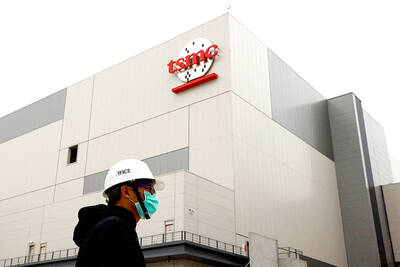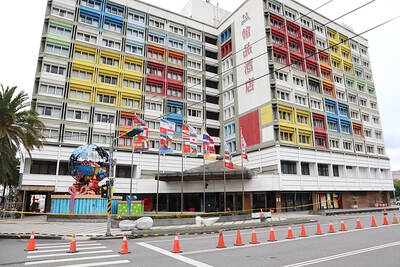GERMANY
Forecast revised upward
The government expects the economic devastation caused by the COVID-19 pandemic to be less severe than originally feared, but it now sees a weaker rebound next year, sources said yesterday. The government revised upward its economic forecast for this year to a decline of 5.8 percent from a previously expected slump of 6.3 percent, two people with knowledge of the data said. That would still be the biggest plunge since the end of World War II. The government revised downward its growth forecast for next year to an expansion of 4.4 percent from its previous estimate of 5.2 percent, the people said.
GAMBLING
Macau revenue slumps
The territory’s casinos last month suffered further pain as gaming revenue dropped more than 90 percent for the fifth straight month, with executives awaiting a recovery after China’s gradual relaxation of travel and visa curbs. Gross gaming revenue was 1.33 billion patacas (US$167 million), down 95 percent from a year earlier, Gaming Inspection & Coordination Bureau data showed. That was in line with the median analyst estimate for a 93 percent decline.
INDIA
Economy contracts 23.9%
The economy contracted by 23.9 percent in the second quarter, its worst performance in at least 24 years, the government announced on Monday, as the COVID-19 pandemic ravaged what was once the world’s fastest-growing major economy. The contraction followed tepid 3.1 percent growth in the first quarter, which was the worst performance in at least eight years, the National Statistical Office said. The nation has reported 3,691,166 cases of COVID-19 and 65,288 deaths.
TEXTILES
Bangladesh exports rebound
Bangladesh’s crucial textile industry last month posted a sharp rebound from the COVID-19 pandemic, with exports surging nearly 50 percent as factories swung into full gear to meet orders from global retailers, officials said yesterday. Shipments of ready-made clothes totaled US$3.3 billion, up from US$2.3 billion a year earlier, the Bangladesh Garment Manufacturers and Exporters Association said. The garment industry is the cornerstone of the Bangladeshi economy, the world’s second-largest exporter after China.
TRADE
Joint initiative planned
The trade ministers of Japan, India and Australia yesterday agreed to work toward achieving supply chain resilience in the Indo-Pacific region, following reports that the three nations are looking to work together to counter China’s dominance. The ministers instructed their officials to promptly hammer out details for an initiative later this year to strengthen supply chains, a joint statement said. They also called on other nations in the region with shared views to participate in the initiative.
PHARMACEUTICALS
Bayer buys Care/of stake
Bayer AG has agreed to buy online vitamin and health supplement company Care/of as the German drugmaker aims to expand its nutrition business. Bayer is acquiring 70 percent of the business in a transaction that values the company at US$225 million, a person familiar with the matter said. Bayer would have an option to buy the rest by 2022, the person said. The deal is an “important milestone” for both Bayer and Care/of, said Bayer spokesman Dan Childs, who declined to comment on the terms of the deal.

Stephen Garrett, a 27-year-old graduate student, always thought he would study in China, but first the country’s restrictive COVID-19 policies made it nearly impossible and now he has other concerns. The cost is one deterrent, but Garrett is more worried about restrictions on academic freedom and the personal risk of being stranded in China. He is not alone. Only about 700 American students are studying at Chinese universities, down from a peak of nearly 25,000 a decade ago, while there are nearly 300,000 Chinese students at US schools. Some young Americans are discouraged from investing their time in China by what they see

Taiwan Semiconductor Manufacturing Co (TSMC, 台積電), the world’s largest contract chipmaker, yesterday reported record sales for the first quarter, which analysts attributed to solid demand for emerging technologies. Consolidated revenue totaled NT$592.64 billion (US$18.51 billion) in the January-to-March period, up 16.5 percent from a year earlier, but down 5.26 percent from the previous quarter, TSMC said in a statement. The first-quarter revenue beat analysts’ average projection of NT$579.5 billion, Bloomberg News reported. That performance lends weight to expectations that the world’s most valuable chipmaker would return to solid growth this year after weathering a post-COVID-19-pandemic cratering of smartphone and computer sales. TSMC is budgeting

HUALIEN BRANCH: The company had been planning to rebuild the hotel before it was damaged in the quake and vowed to give affected employees the option to transfer The owner of Chateau de Chine Hualien (花蓮翰品酒店) is planning to lay off 86 workers after shutting down the hotel due to damage it sustained in a powerful earthquake on Wednesday last week, the Ministry of Labor said yesterday. The hotel has submitted a layoff report to the Hualien County Government and expects to let 69 workers go this month and 17 next month, the ministry said. LDC Hotels & Resorts Group (雲朗觀光集團), the owner of Chateau de Chine Hualien, confirmed the layoff plan in a statement yesterday. LDC said the hotel has been closed since Wednesday last week when the temblor occurred

US CONSCULTANT: The US Department of Commerce’s Ursula Burns is a rarely seen US government consultant to be put forward to sit on the board, nominated as an independent director Taiwan Semiconductor Manufacturing Co (TSMC, 台積電), the world’s largest contract chipmaker, yesterday nominated 10 candidates for its new board of directors, including Ursula Burns from the US Department of Commerce. It is rare that TSMC has nominated a US government consultant to sit on its board. Burns was nominated as one of seven independent directors. She is vice chair of the department’s Advisory Council on Supply Chain Competitiveness. Burns is to stand for election at TSMC’s annual shareholders’ meeting on June 4 along with the rest of the candidates. TSMC chairman Mark Liu (劉德音) was not on the list after in December last